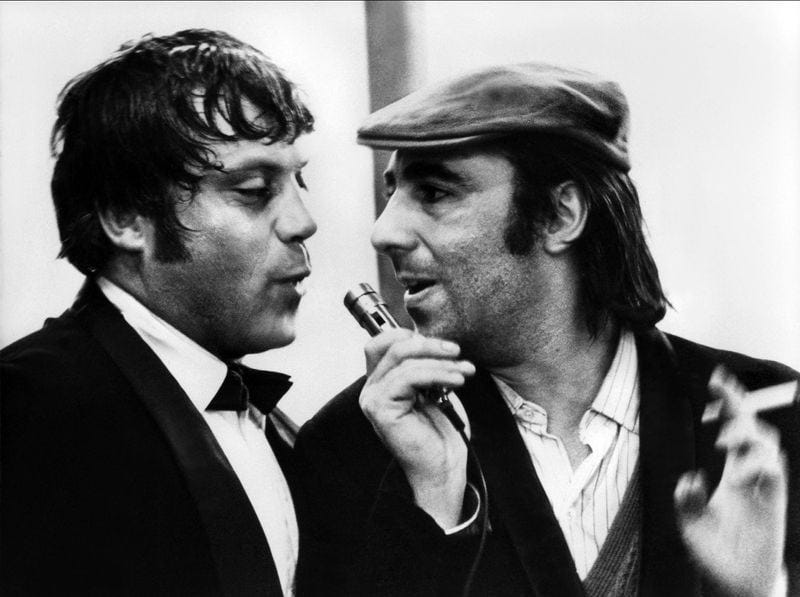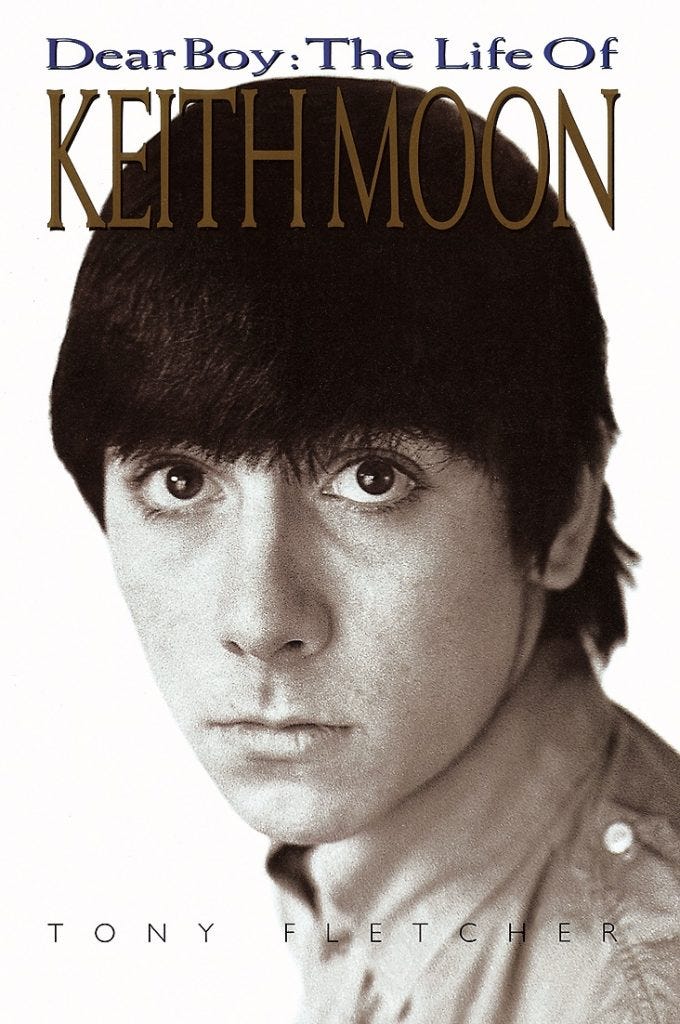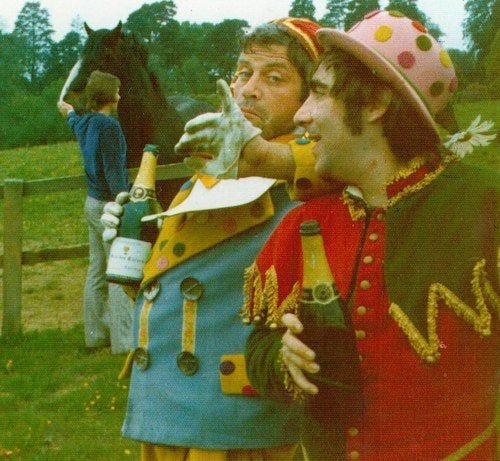"I'm not THAT f***ing old, you know."
Drinking in Oliver Reed. Part 1
Tony Fletcher, Wordsmith is a reader-supported publication, with a Midweek Update full of news and recommendations, and a longer weekend post. Midweek posts are free. This interview is the second in a series ‘From the Keith Moon Archives,’ digging into the transcripts and back stories from the many incredible conversations I conducted for my 1998 biography Dear Boy: The Life of Keith Moon (a.k.a. Moon: The Life & Death of a Rock Legend in the USA), and follows on from my Alice Cooper interview and an extract from the biography. This particular Oliver Reed interview is for paid subscribers only, though a lengthy part of the introduction follows below for everyone. Subscriptions start at just $5 a month.
“I’m not THAT fucking old, you know!”
As far as greetings go, it is hard to imagine one more emphatic.
But when it’s being delivered to you by the person you now realize is the great and greatly feared actor Oliver Reed, it is… well, it is possibly not the best of starts to an interview.
But. Let’s rewind a little.

When compiling a list of characters I wanted to interview for my Keith Moon biography, Oliver Reed was always near the top of the list. He and Moon became what we might call “running buddies” after meeting for the movie Tommy, in which Reed – whose flag was flying high following starring roles in Oliver!, Women In Love and The Devils - was cast as Tommy’s “uncle” Frank, opposite Ann Margret as Tommy’s mother.
Reed’s reputation as a “hellraiser” was already on par with that of Keith Moon, and the pair’s immediate friendship, and attendant mischief making, quickly became the stuff of newspaper headlines and subsequent legend. It was a friendship that persisted on into Los Angeles and beyond, and I figured that Reed would have plenty to say about that friendship and those antics, if I could get him to commit to it.
I’m not quite sure how I found his agency details. I know that once I was ensconced in London for six months in 1996, then in those pre-Internet days, I did go to central Libraries and literally open up the book of actors’ agents – a sort of yellow pages for the famous – and write down a whole bunch of relevant phone numbers. And while I generally act on a connection, a reference of sorts, I do believe that in this case I put in a phone call, followed up with the requisite fax, and all of about a week later, received a phone call from Reed’s agent.
“Oliver would be delighted to talk with you,” the agent told me. "He lives in Ireland, so you could do it over the phone, or if you want to go out there and meet him, that would be fine with him too. Here’s his phone number. His wife Josephine will probably pick up, they are expecting your call.”
Now, you might be surprised that such a famous – and infamously combative - actor agreed to talk with me quite so quickly. Additionally, that he was handing out his home phone number to people he didn’t even know.
But I learned two things that year from working on the Keith Moon book. Firstly, that my prospective subjects were ready, willing, able and indeed eager to talk about Keith. Nobody had written a proper biography about a man that so many people loved, and the right number of years had passed since my subject’s own passing. As many of his surviving peers moved into middle age, they were becoming comfortable with their – or at least Keith’s – raucous past, were able to reconcile and analyze their relationships with him in the rearview mirror, with sufficient perspective, and wanted to get those memories and thoughts on the record while they could. I wasn’t a famous biographer, but I had some credibility - two books, a substantial stack of freelance clippings, and if not quite the Moon family’s or The Who’s full-throated endorsement, then certainly nobody trying to put the kibosh on the project. Under all these circumstances, Oliver was just one of many famous names whose proverbial door opened at first time of knocking.
Secondly, I learned that the truly famous – not the latest upstarts, nor the prima donnas, but the people who occupied a higher sphere of celebrity, one that would likely not disappear even if they stopped working – handle their own affairs. A few months later, Larry Hagman would call me on a Sunday lunchtime, during my son Campbell’s second birthday party. A year after that, Roger Daltrey called me direct as I got out of the shower - though that conversation is off the record. And only a couple of years back now, Bruce Springsteen agreed to be interviewed for my Eddie Floyd co-write and similarly called me from a number that wasn’t even protected by Caller ID. (Of course, it may have been a burner!) These are all people comfortable with conducting their own business, dealing one-on-one, stripping the middle person out of the way as soon as they’ve confirmed a project’s authenticity.
Oliver Reed: “Keith Moon was a fellow for me who convinced me that … life should not and can not and WILL not be taken seriously. It can be taken seriously in as much as there is pain and there is laughter and there is sweetness, but in between those olfactory senses, and sense of smell and hearing, that there is a sense of the bizarre.”
So, I called. I knew of Josephine: she had been the subject of much tabloid finger-pointing when she started seeing Oliver at age 16, in 1980. Reed was 42 at the time. Confounding the sceptics, the couple married in 1985, and here we were, more than a decade later, Josephine was now in her thirties, Reed in his late fifties, and the age gap must have seemed ever smaller.
Sure enough, Josephine picked up, confirmed that they were expecting my call, and when I expressed willingness to come to Ireland, effectively offered – or insisted – to arrange the meet. My budget for the time in London that year wasn’t large, but I had the book advance in the bank, a monthly consultancy fee coming from RCA Records, and our rent was covered almost to the penny by the sublet income from our Manhattan apartment. There weren’t any other sizeable trips on the horizon, and the opportunity to meet with Oliver Reed in person was too inviting to turn down. We agreed to make a weekend of it: myself, my wife, and our baby, spending one night in a countryside Inn and another in Cork. And in-between, we’d drive to the town of Mallow, where Josephine asked me to meet Oliver Reed on a Saturday lunchtime at the Hibernian Hotel. [It is called that now. I think it might have had a different name back then.]
Not knowing of Mallow, but knowing how famous actors comported themselves for interviews, I presumed we were talking about a stately home hotel, perhaps a castle. I expected I’d park on a gravel forecourt, a besuited receptionist would cast weary eyes over me when I entered in casual clothes, and I would be led to a drawing room or library where Mr. Reed would be sat resplendent in a leather armchair, waiting to grill me about my purpose. (Why did I not just look up a photo of the hotel on Google? No Google! No browsers with photos even!)
Additionally, I knew nothing of Reed’s current personal lifestyle. He was getting on in years and I’d already met a few interviewees who were confirmed ex-drinkers. I was clueless as to whether he had also sobered up, or was still on the sauce, or had settled into what we now call a “social drinking” routine whereby he could stop after a couple. In short, I was in the dark about much of our encounter except the time and place and Josephine’s assurance he would be there and ready to talk.
Mallow turned out to be a market town, not too dissimilar from Beverley in Yorkshire, where I was born, and it was thriving on a Saturday lunchtime. As for the Hibernian, far from being a stately five-star castle out in the fields, it was your regular well-equipped but terraced (as far as I recall) three-star town Hotel, very very much on the main road - to the point that dropping me off at the front door posed a problem what with all the traffic. Knowing from past experience that committed drinkers often insisted you drink with them – we’ll do my day with Keith Richards another time – and bowing to precaution, I nonetheless suggested that my wife keep the keys to the rental car, just in case.
The hotel had a reception almost immediately inside the front door, and I recall it led off on one side to a large lounge bar area that was bustling with activity. I introduced myself to the receptionist as a Mr. Fletcher with an appointment for Mr. Olver Reed.
“Ah yes, Mr. Fletcher, Mr. Reed called a while back with a message.” And as he went to retrieve it from whatever cubby hole he’d kept it in for safe keeping, my heart sank. I’d come all this way and Ollie was going to stand me up.
“Yes, Mr. Reed apologized but he will be delayed. He’s taking a neighbor’s cow to the vet.”




